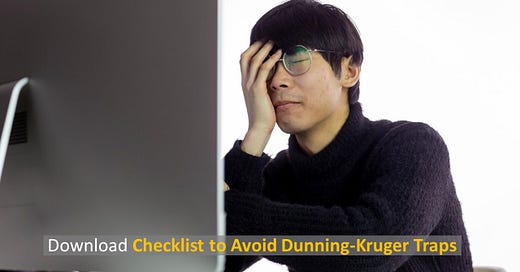11 Dunning-Kruger Effect Traps in Client Relationship Management
Find how you often go wrong in Client Relationship Management & download Leader's check sheet
The fall of Byju’s, once hailed as India’s ed-tech unicorn, started with its rapid expansion during the COVID-19 pandemic, which led to cash-flow problems. Now, everyone says the company overestimated its ability to manage such rapid growth without fully understanding the risks. But a few years ago, they were regarded as the daredevils of unicorns.
Putting aside the issues of financial mismanagement and other aspects, I wish to emphasize an underlying psychological phenomenon: a cognitive bias called the Dunning-Kruger Effect.
Byju's is not alone in this game. According to the IBM Institute for Business Value and Oxford Economics, around 90% of Indian startups fail within the first five years.
And it's not just startups. Google's recent streak of mediocre performance, including Gemini, and even AstraZeneca's withdrawal of Covid vaccines are signs of the Dunning-Kruger Effect. So what is this phenomenon?
Dunning-Kruger Effect
It refers to a cognitive bias where people with low ability in a particular area tend to overestimate their competence, while those with high ability may underestimate their competence.
Psychologists Dunning and Kruger discovered this phenomenon in 1999. It stems from the inability to objectively recognize one’s own incompetence.
It is quite common to see kids overestimate their ability to achieve a goal. And it's not just kids; even politicians often fall into this trap. With as many as 64 countries in the world having elections in 2024, it's something to watch out for.
In this world of opportunities, thinking big and taking risks are considered success mantras. Professionals are bombarded with data, opinions, and expertise that often lead to overconfidence, where individuals assume they know more than they actually do. Social media platforms and influencers amplify self-assuredness.
And then, professionals often feel pressure to project confidence. Admitting ignorance or seeking help may be perceived as weakness, leading to overestimation of abilities.
Another significant problem is assuming skills in one area automatically translate to expertise in another.
In essence, it is not easy for professionals in today's world to objectively assess their competence or that of their organization's.
So, in today's world, it's unavoidable to be Dunning-Kruger biased :-)
11 Dunning-Kruger Effect Traps in Client Relationship Management
When it comes to my forte, Client Relationship Management and Client Centric Business Growth, here are a few pitfalls to watch out for:
Over-promising to clients: Making commitments that exceed the organization's capabilities or resources can lead to dissatisfaction and erode trust with clients. Sometimes this is done in mere impulse.
Creating unrealistic and aggressive plans: Setting overly ambitious targets or timelines without considering potential challenges or constraints can result in missed goals and disappointment for both the organization and its clients.
Selling a grandeur vision: Like real estate agents, you can sell the future state, assuming everything will fall into place at the right time, but it need not, and that can become a significant disappointment in client relationships.
Setting unrealistic targets for the team: Unrealistic targets can lead to stress, burnout, and a focus on short-term results over long-term client satisfaction.
Making too many assumptions: Assuming without sufficient evidence can lead to misunderstandings and misaligned expectations with clients.
Multitasking: Attempting to juggle multiple tasks simultaneously can lead to decreased focus, reduced quality of work, and increased chances of errors.
Assuming the client already trusts you enough: Trust is earned through consistent actions and transparent communication over time. Assuming trust merely because you got the contract, particularly without actively cultivating it, can lead to complacency and neglect of the client relationship.
Overestimating the team's capabilities: Overconfidence in the team's abilities can lead to taking on projects beyond their capacity, resulting in delays, quality issues, or failure to deliver on promises.
Underestimating competition: Ignoring or underestimating competitors can result in missed opportunities and a failure to differentiate the organization's offerings effectively. It's important to conduct regular competitive analysis and stay informed about industry trends to remain competitive in the marketplace.
Oversimplification of the situation at hand: Complex client issues require thorough analysis and thoughtful consideration. Oversimplifying problems can lead to superficial solutions that fail to address underlying challenges effectively.
Overly relying on outsourcing: While outsourcing can provide valuable expertise and resources, relying too heavily on external partners can lead to a loss of control over quality and communication.
I hope this was helpful.
Client-Centric Decision-Making Checklist: Avoiding Dunning-Kruger Traps
If you are interested to know more, you can also contact us at Business.Support@collaborat.com.
Read More
Read past issues of this fortnightly editorial here.
As always, happy to hear your views in the comments.






Thanks for putting the Dunning-Kruger Effect in the lens of Client Relationship Management. A brilliant read indeed.